IN FOCUS: Facing death - the changing attitudes to funerals and wakes
More people in Singapore are now open to the discussion of their own death, helped along by the evolving image of funerals.
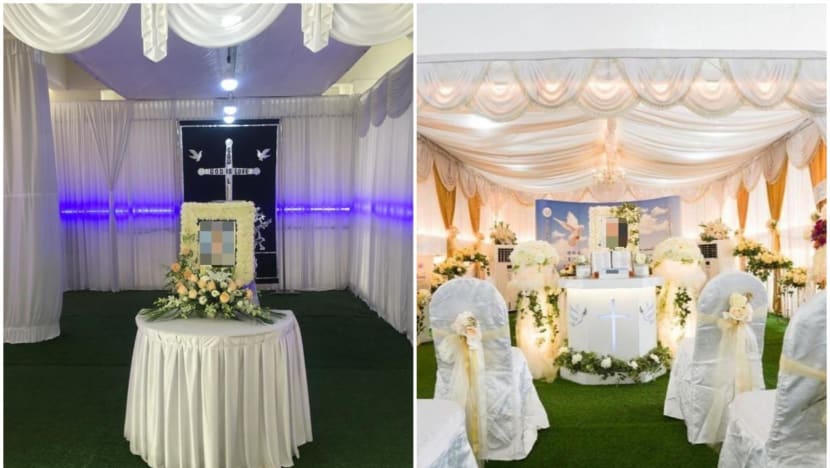
An older Christian funeral setup in 2019 (left) versus the newer concept done between 2021 and 2022, both were handled by funeral director Passion Bereavement Care. (Photos: Passion Bereavement Care)
- The conversation about death is slowly opening up, but a national approach on dealing with grief may still be needed
- With more requesting personalised wakes, funerals are increasingly being seen as a celebration of life
- More people are planning their own funerals, seeing it as a way to relieve a burden from loved ones and a means to take back some control
SINGAPORE: He is 37 and not ill, but Mr Calvin Pang already has plans in place for a funeral that might not happen for decades to come.
The art therapist at a local hospice wants to have a wake lasting one or two days before having his remains cremated and his ashes scattered in the sea.
"I wanted something very simple. I wanted something that is true to how I always see life as impermanent, and I don’t want it to be a thing that will be memorialised in one way or another. It's just a passing through," Mr Pang told CNA while contemplating a subject many people shun: One’s own death.
Those in the business of death, however, said that the conversation in this space has been gradually opening up, prompted in part by the COVID-19 pandemic which has brought the subject closer to home.
Singapore has also moved closer to the topic through initiatives such as the 2023 National Strategy for Palliative Care which outlines recommendations to beef up palliative care, and launching online portals such as My Legacy, where a person can store and share end-of-life plans and access related services.
Still, there is scope for even more conversations about what happens in the lead-up to a loved one's final moments and after their death, one expert noted.
With an ageing population, annual deaths here are expected to rise from around 24,000 in 2021 to 40,000 in 2040, and infrastructure needs to be in place to support the bereaved, said Nanyang Technological University’s (NTU) Associate Professor of Psychology and Medicine Andy Ho.
One crucial component in that infrastructure is the funeral director, who becomes the main point of contact after a loved one dies.
.jpg?itok=FqkECUb6)
Undertakers that CNA spoke to believe that attitudes towards death and dying have been changing, with people increasingly receptive to funerals that celebrate the life of the departed, thus elevating the image of wakes from what may be seen by some as grim affairs in their traditional form.
Alongside that, funeral companies have observed a growing number of people planning their funerals ahead of their demise, with even healthy individuals like Mr Pang facing the issue of their own death unflinchingly.
GENERATIONAL SHIFT IN ATTITUDES TOWARDS DEATH
With more than two decades of experience in the field, funeral director Ang Ziqian has seen how attitudes towards death have changed with the times.
"When I was young, pre-planning was quite common in my grandfather's time," said the managing director of Ang Chin Moh Funeral Directors.
Hailing from a line of funeral parlour predecessors, Mr Ang is the fourth generation of his family to work in this field.
According to Mr Ang, migrant workers that first came to Singapore would often buy a casket so that they could be repatriated to their homeland after death.
"When Singapore started to prosper and people had money, (people) became scared to die. This is one of the reasons why they don't talk about death and dying," Mr Ang said.
Where cemeteries were commonly found in the past, modernisation and urban planning began pushing cemeteries to rural areas such as Lim Chu Kang and Mandai, separating death from the living, he added.
"There's an artificial divide, so people won't talk about it because it's not in your face."
NTU’s Dr Ho, who runs an undergraduate psychology module called The Last Dance: Psycho-Socio-Cultural Perspectives on Death, Dying and Bereavement to educate students about the topic, described the attitudes towards death here as a “paradox”.
“On the one hand, we're very afraid of death. So when someone starts talking about death, we say ‘choi’ (a Cantonese word to ward off bad luck), they don't want to talk about this. When they see a hearse coming, they walk in the other direction.”
People are afraid of death because they think of it as “bad luck” and believe that someone who is recently bereaved will “pollute” with their aura, he said.
“On the other hand, we're also death worshipping – we have the Qing Ming festival, we have the ghost festival. And when these things occur, we celebrate death,” the associate professor noted.
These attitudes hark back to religious and philosophical teachings about karma and reincarnation, which tell of how your actions affect your afterlife.
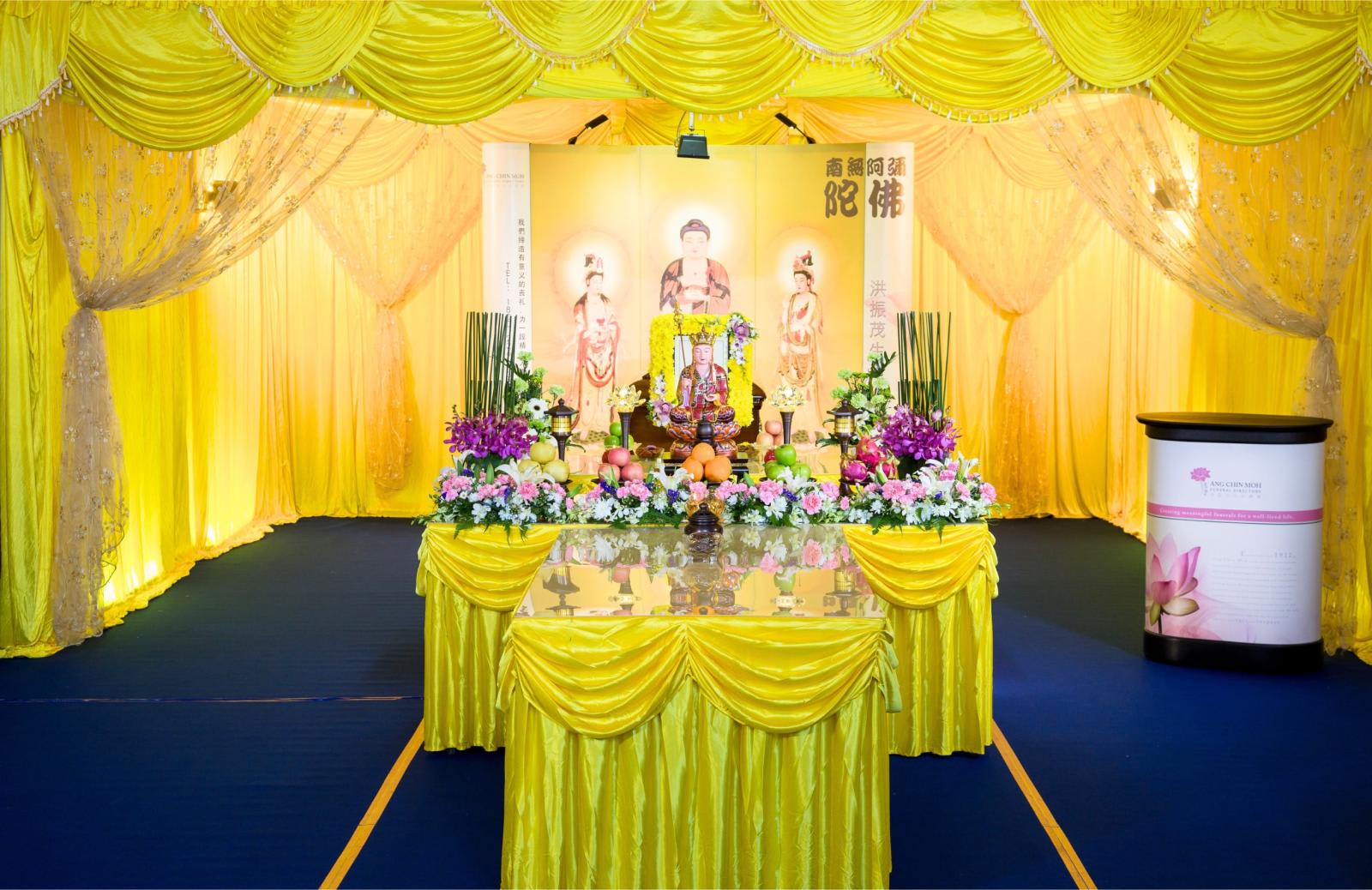
In traditional Chinese practices, funeral rites are not only ways to respect the dead, but are seen as social acts where a deceased person’s power and status are symbolically transferred to his descendants, said Dr Ho.
That said, the younger generations are not as bound by traditional thinking and are more pragmatic about how much they spend on funerals while still remaining respectful to some traditional thoughts, he noted.
Discussion and public education about the importance of talking about death is on the rise, a move also driven by the government’s effort to make pre-planning for old age more accessible.
“I think we're slowly progressing towards a country that is more death accepting and more ready to talk about it,” observed Dr Ho.
“But it still has not affected the masses of population. But we're getting there. So I think the culture has changed, is changing slowly, but in a positive way.”
The Association of Funeral Directors (Singapore), which has more than 30 members, said it has seen a “ societal push for elderhood planning” through documents such as the Lasting Power of Attorney, advance medical directives and will writing.
“The eventual and definite planning of the funeral is a natural progression. Elders who are more aware of such tools available are comfortable to broach the topic of death as they see it as being responsible for their own final farewell and not leaving the surviving families to second guess their wishes,” said the association's executive director Hoo Hung Chye, who is also the founder of Singapore Funeral Services.
REVAMPING THE IMAGE OF FUNERALS
Speaking in his capacity as Singapore Funeral Services founder and funeral director, Mr Hoo, who's been part of the industry since 2000, said funeral businesses have come a long way.
“Back then you still had undertakers in shorts and slippers ... (now) I hardly see any of those. So we’ve managed to raise the standards of funeral services to what you see today, the modernisation of the services provided.”
Apart from service standards, undertakers have also seen preferences shift from cookie-cutter funerals towards personalised choices.
Mr Jacky Tan, funeral director and operations manager of Serenity Casket & Funerals, which handles wakes for Christians and freethinkers, summed it up: “The younger generation is embracing funerals as a celebration of life rather than ceremonies centred around death. They are gravitating towards more contemporary and straightforward funeral arrangements.”
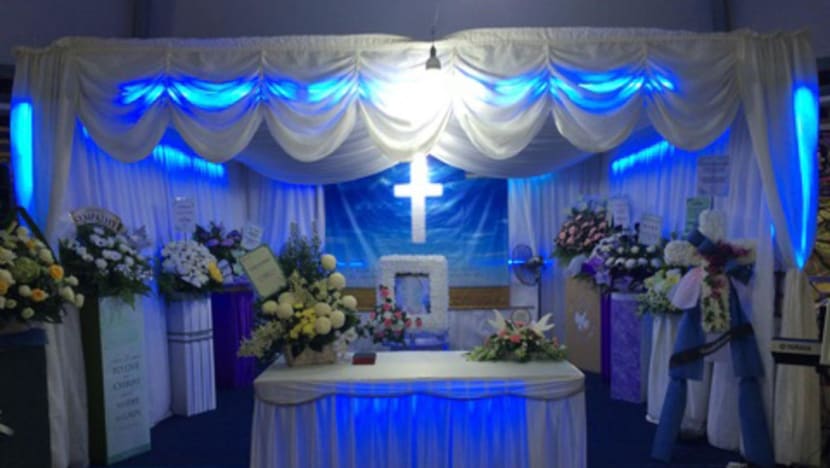
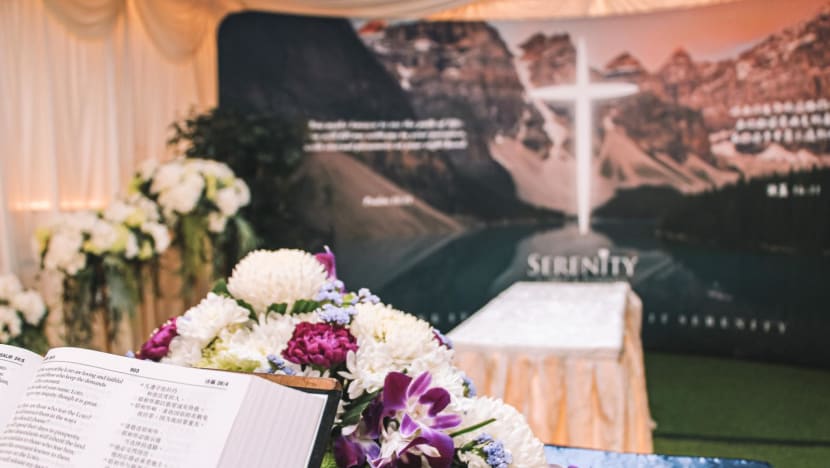
For example, at Taoist funerals, family members used to wear traditional funeral garb made of jute – a material similar to a sack – and pin a small piece of coloured cloth to their sleeves to signify mourning. Now, mourners prefer to wear a simple white top with a black bottom.
Aside from industry veterans like Mr Hoo and Mr Ang, a number of newer companies are breathing a new lease of life into what is traditionally seen as something of a taboo subject.
Funeral director Angjolie Mei founded her company The Life Celebrant in 2010 with the objective of celebrating the deceased’s life during the wake. Before that, she helped run her father’s business, Ang Yew Seng Funeral Parlour, in 2004 after his death.
“I remember when I first started the concept of funeral celebrant in 2010. It was something that people were not used to, but they appreciate it because I talked about the person's life story,” Ms Angjolie said.
“They realised it was actually more meaningful. But back then in 2010, people were still trying to accept this idea.”
She has helped a six-year-old girl who had a brain tumour arrange a "princess party" funeral where the child decided the decor, colours and her final outfit. Another cancer-stricken client recorded a song and messages with her music therapist, which were eventually played at her wake and lightened the sombre mood.
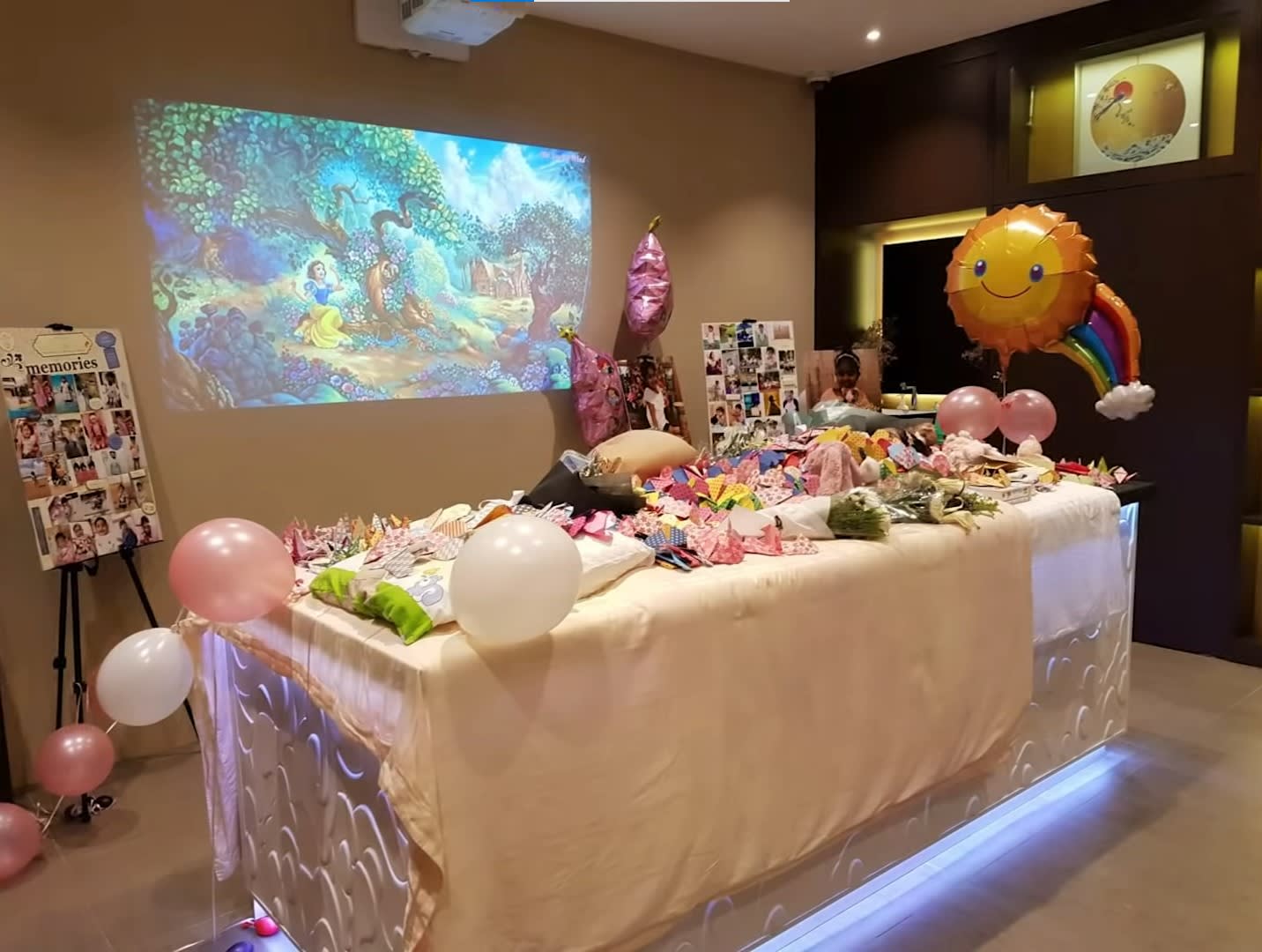
The concept was to have the family show their gratitude and give thanks in carrying out a final act of service, Ms Angjolie said.
The idea was inspired by the 2008 movie Departures, which captured how a Japanese mortician prepared the deceased’s body in front of loved ones.
“When I first started, people thought I was crazy,” she recalled. However, the process helped dispel notions of death as a fearful event, and clients found it therapeutic.
Founder of Passion Bereavement Care Deborah Kang entered the industry in 2019 with a mind to provide funerals that were uplifting rather than gloomy.
Passion Bereavement Care only handles funerals for Christians and freethinkers. Religion has guided Ms Kang’s outlook on death and her approach to funerals.
After a few setups that followed the more traditional style, Ms Kang decided to elevate the concept by incorporating the use of colour and different textures, and took reference from the Bible.
"As Christians, we are also considered as bride of Christ, so this is also a celebration and banquet for our Christ and our loved ones ... so our wakes always look peaceful, heartwarming, glorious and honorable.
"To us, death is not a horrifying thing ... we are going back to the home that God has created for us. It’s a glorified moment," she said, showing photos of how the current wakes she arranges reflect that.
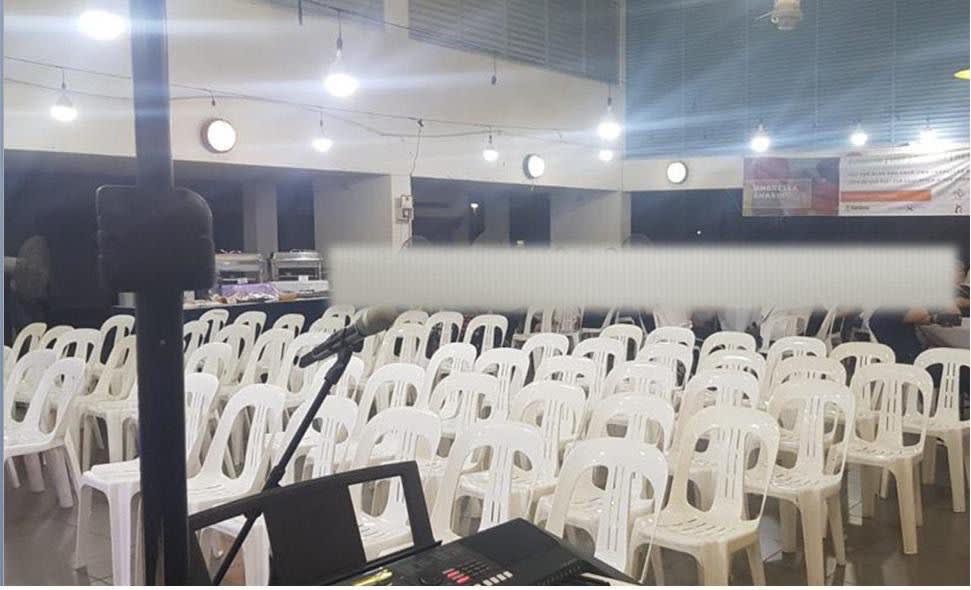
Celebrating a deceased’s life achievement is a great way to “reframe death”, said Dr Ho.
“When someone passes on it is solemn, it's a sad situation, but we can also think of it as a life graduation.
Being able to celebrate the achievements and wisdom of the departed helps the living learn and embody the values in their own life experiences, he said. “In fact, that's probably one of the more important ways for us to transform grief into something that helps us live life better.”
MORE PEOPLE PRE-PLANNING FUNERALS
The industry has seen a rise in the number of people planning funerals ahead of time, from those who are terminally ill to hale and hearty individuals as young as 35.
“In the 1990s or 2000s, people call funeral companies when death has occurred. That is my father's time,” said Ang Chin Moh Funeral Directors’ Mr Ang. “Today, people have more pre-arrangements, and this comes in when the doctor tells the family or when the patients go to the palliative stage and are given a timeline.”
Ang Chin Moh Funeral Directors receives requests for pre-planned funerals nearly every other day, he said. Of these, 80 per cent are critically ill while the remaining are healthy.
Similarly, Singapore Funeral Services, which rarely had requests for pre-planning a decade ago, now sees between 10 and 20 interested clients in a month.
The Life Celebrant’s Ms Angjolie saw her first pre-planning client in 2013, one of a few that year.
Numbers have now tripled in part due to The Life Legacy, a professional estate planning arm under The Life Celebrant which Ms Angjolie started in 2016. As part of the service, The Life Legacy helps customers draw up legal documents such as wills and includes funeral pre-planning as part of the package.
Direct Funeral Services said it has been receiving more enquiries about funeral pre-planning since the pandemic, with a bulk of clients having critically ill loved ones, and a small percentage who are 60 and above but in relatively good health.
Managing director Jenny Tay said: “Pre-planning your own funeral can be as simple as discussing your preference of the funeral ceremony with your family members. You can start by thinking of the photo portrait to use, the clothes you want to be dressed in, the kind of music or floral arrangement you like.
“With a general idea in mind, you can then do some research on funeral companies that best meet your needs, preferences, and importantly, budget. Don’t be quick to choose a funeral company. Instead, do take the time to go meet with the representatives from your shortlisted companies.”
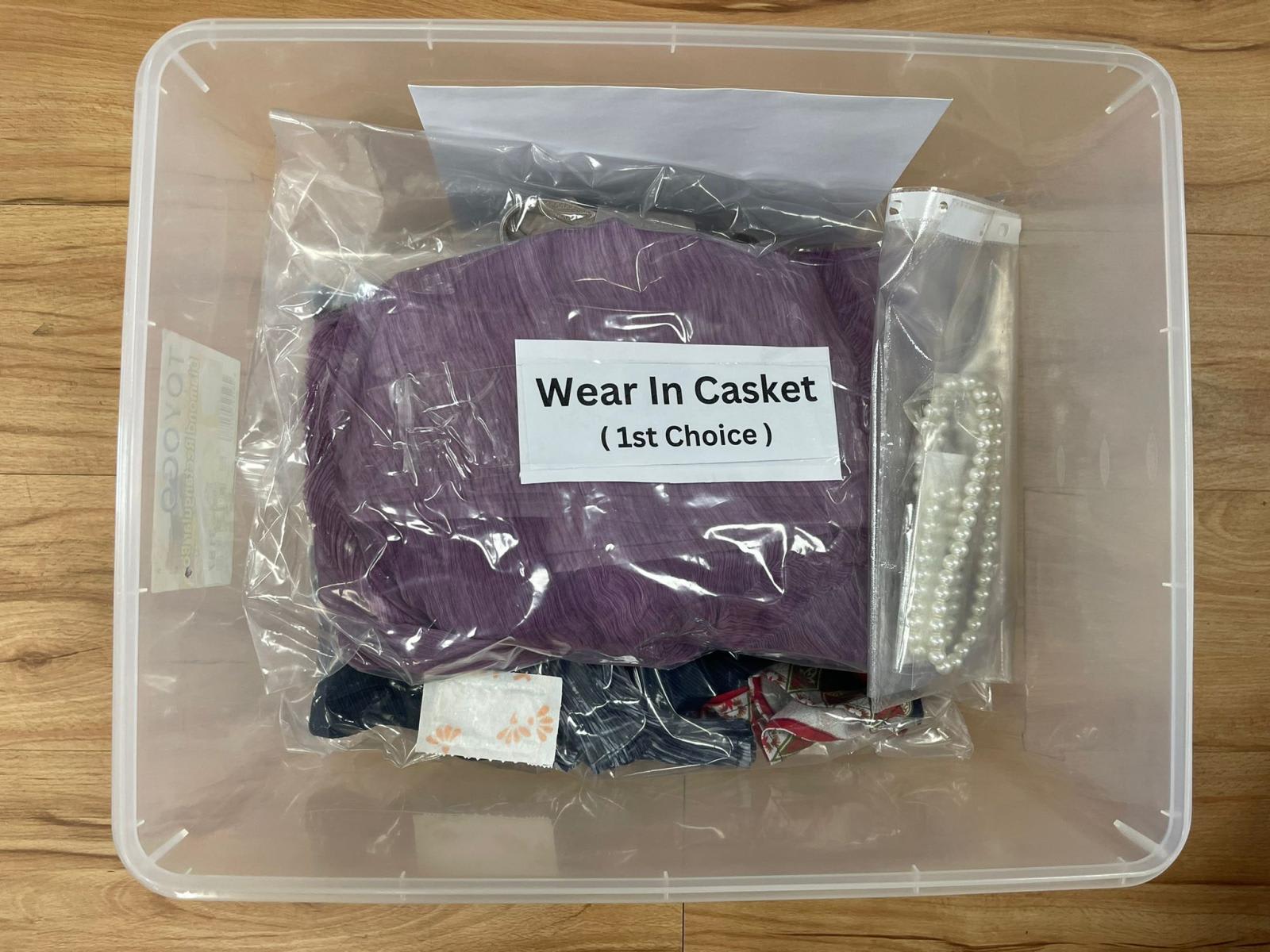
“IT’S MY LAST GIFT TO THEM”
His mother’s death from cancer in 2014 prompted Mr Pang to enter the field of palliative care, but his father’s sudden death from a cardiac arrest four years later made him realise the importance of planning for the unexpected.
“My sister and I, we became the recipients of the fruits of his planning,” Mr Pang said, explaining how his father had settled his insurance and CPF nominations beforehand.
“That kind of prompted me to think about my own life and then when I have my own family, what can I do for them?”
While not yet married, Mr Pang plans to settle down with his girlfriend and her child from a previous marriage – which was one of his main considerations in planning ahead.
“Essentially when we tie the knot, I will become a stepdad almost immediately.”
Apart from planning his funeral, Mr Pang has also drawn up his will, an advance care plan, advance medical directive and his Lasting Power of Attorney with The Life Celebrant.
Facing death in his workplace was another push factor.
“I have also witnessed a bulk of younger patients being admitted here. So I think that also prompted me to think about how one day I might be in the horizontal position, somebody might be in a vertical position putting me on the bed.
“So there will be a switch. I no longer will be the clinician. I could be the patient at any point in time.”
If that does happen, Mr Pang wants to take the responsibility of planning his funeral off his family.
“Do I really want my family members to worry about things or at that point in time when death happens, I just want them to feel that I love them, and they don't need to worry about making decisions?
“It's essentially the last present I can give them. The last gift, in a way. Maybe it's the perspective of how men are breadwinners and then men will want to provide for the family, but how do you continue providing for your family when you're no longer around?”
AVOIDING CONFLICT AND SECOND GUESSING, MAINTAINING CONTROL
Clients have told undertakers that planning their own funerals helps avoid conflict or second guessing among surviving family members.
For Mr Ang’s client, a 90-year-old woman he identified as Ah Ma, it was her way of taking control and maintaining her dignity. As a daughter-in-law in a traditional Chinese family, Ah Ma did not have much say in the household.
“Right now, she has the freedom, she wants to choose something that belongs to her, something that she can control … it gives her control and self esteem at the final stage," Mr Ang stated.
Alighting on the same point, Dr Ho said: “This is important because oftentimes when patients are facing end-of-life, they have complete loss of control. They become totally dependent on other people to button their shirt, feed them, go to the bathroom with them. And that's not very dignifying.
“But if I can have some control, if I can make some decision, if I can plan something, those actions actually help people feel a lot more dignified. It enhances the quality of life and it helps them to even uphold hope in the face of death.”
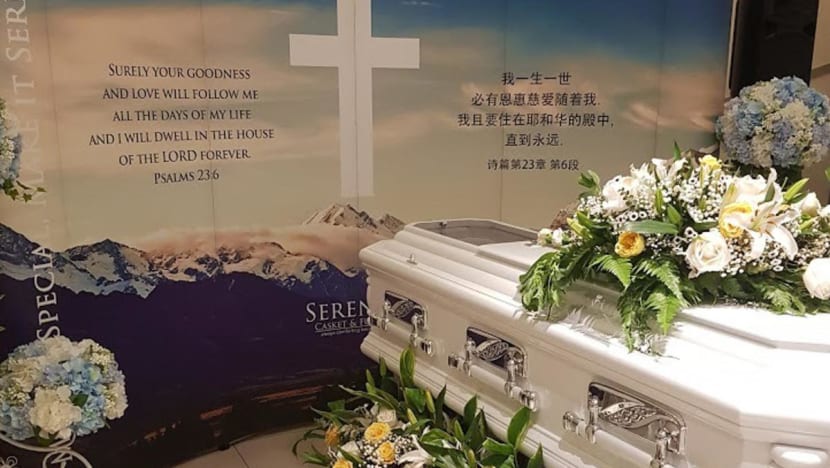
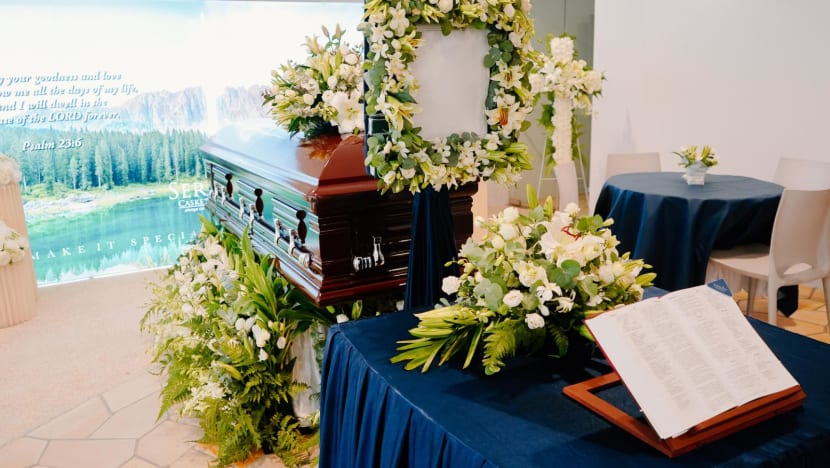
Undertakers also said the decision process helped families accept death and consequently to gain closure after the demise of a loved one.
Passion Bereavement Care’s Ms Kang said that pre-planning can help a family “walk out of grief more easily”, as the funeral would have fulfilled the deceased’s last wishes.
"Pre-planning gives me more space to understand the client's needs," said Ms Kang, as clients are not in a rush to make decisions in a moment of grief.
WHAT POST-DEATH MAY LOOK LIKE IN THE FUTURE
With the number of deaths projected to increase, Dr Ho thinks that more regulation and a national agenda and policy on grief and bereavement will be needed.
While initiatives that lead pre-planning efforts are great, these focus on pre-loss, said Dr Ho.
“What about people who passed on? What about the bereaved family? If you think about dying or mortality as such a big issue, there's about 20,000 to 23,000 people who die in Singapore every single year, right? That's a substantial number.
“Let's say, if one person died, that affects at least six people – six people per family – then the number of people that is affected by grief every single year is six times that, that's about 120,000 to 130,000 people affected by grief every single year, right?
“So that's a huge amount of people, but there's no national policy on grief and bereavement," said Dr Ho, adding that a national policy could look at regulating the funeral industry to play a key role in supporting the bereaved.
To meet the rise in deaths that comes with an ageing society, Singapore has been ramping up after-death facilities. In recent years, it opened an inland ash scattering garden at Choa Chu Kang Cemetery Complex as an alternative to sea burials and niches in a crematorium, and the first of four planned funeral parlour complexes, Woodlands Memorial, opened its doors in March this year.
The nine-storey building houses funeral halls and columbaria among peaceful and breezy sky gardens on every floor – another counterpoint to the dreary notion of death.
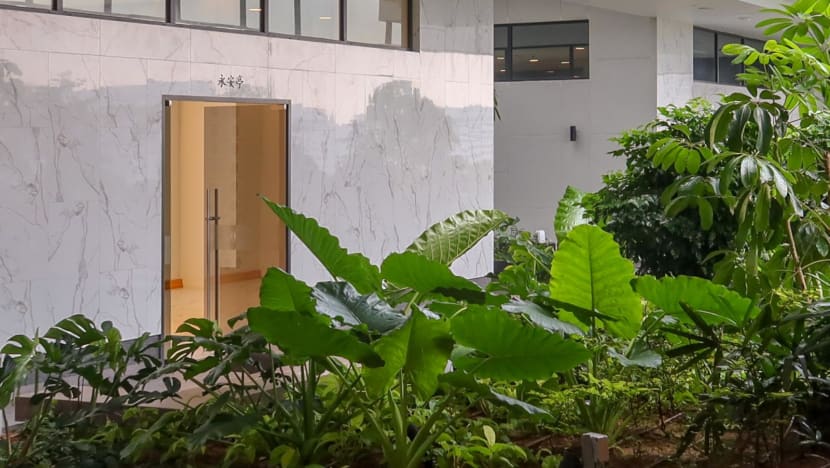
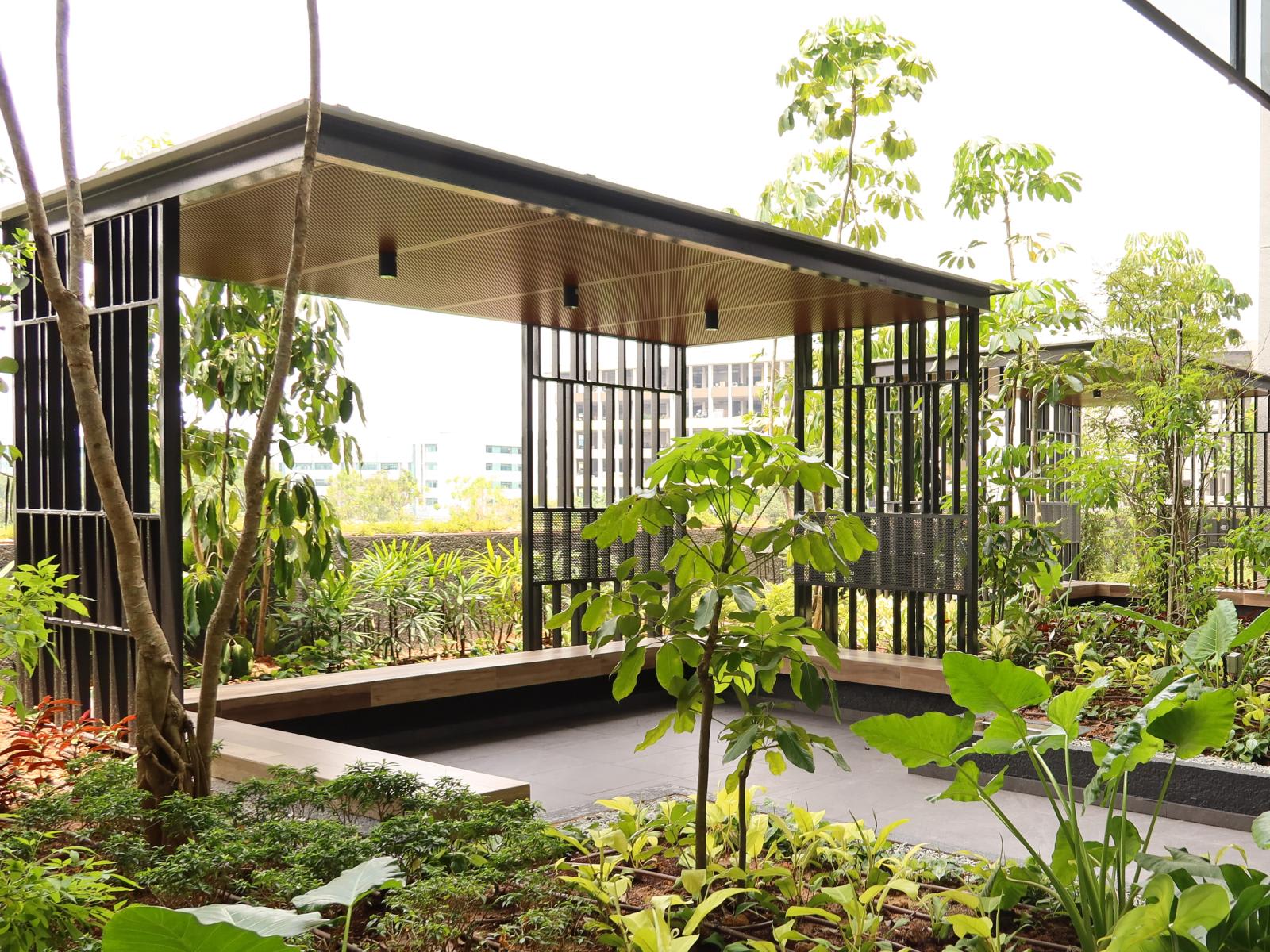
Its CEO Jason Poh told CNA that he sees a movement towards centralised locations, such as funeral parlours, for after-death services. Those at a loss about what to do after the passing of a loved one appreciate not having to visit different places for different services, Mr Poh observed.
With infrastructure sprouting in place, what’s left is for people to actually talk about death and dying – a topic that Mr Pang has no qualms discussing.
“I think people need to start talking about or thinking about it, because I think it helps us live better,” he said.
“At some point, we will die. And I think it's not about avoiding a topic but how can we talk about it? Sometimes it's very simple things like seeing a leaf fall from a tree, but I think Singapore is very effective because we have people in the community that will clean up your estates.
“So sometimes we don't get reminded that death occurs all around us. When you travel to other countries, you may see carcasses of animals, like birds, or maybe some road kills. Then it will really remind you that mortality actually is around us. But over here we don't even get reminded that the leaf will fall because it gets swept out.”





















